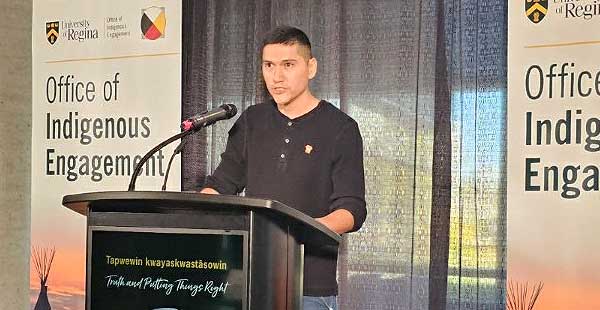The University of Regina releases its Indigenous engagement strategy - tapwewin kwayaskwastâsowin
- Local Journalism Initiative - Memory McLeod | October 23, 2023
The University of Regina aims to be more inclusive and culturally affirming learning environment.
After undertaking a broad consultation process involving staff, students and faculty, including those at satellite campuses as well as Indigenous bands and community leaders, the U of R unveiled its Indigenous strategy called the tapwewin kwayaskwastâsowin.
When Moses Gordon began undergraduate studies at the university Indigenous engagement wasn’t a high priority.
“In terms of classes offered and content, it was largely western and euro-centric and this was in Canadian History,” he said. “These 34 actions are meant to create a more inclusive space where our own Indigenous perspectives are brought into view. We have to stand up and carve out our own space and this was our chance to do that.”
Gordon, a PhD candidate of the Johnson-Shoyama Graduate School of Public Policy, was able to bring a unique perspective both as a policy changer and as a long-time student to the Project Advisory Committee.
He described the 34 actions put forth as a way to “formalize our visions as Indigenous students and staff in a wonderful way.”.
“If we want our people to have that sense of belonging, we have to present our own methodologies and worldviews,” said Gordon. “We wanted to implement changes that ensure students have the support and mentorship they need.”
Besides incorporating Indigenous world view, voices and curriculum Gordon also pointed out such considerations as Indigenous-led research and protection of grants and monies meant for First Nations, Inuit and Métis students.
“One of the action items we looked at is development of an identity committee in terms of avoiding ‘pretendians’, so that we are equipped in the future to ensure those kinds of things don't happen,” he said.
Proposed changes will be seen throughout the institution, implementation will be spearheaded by the office of Indigenous Engagement at the U of R.
“Last year we undertook a process of enquiry to develop a plan to implement institute-wide systemic changes following broad consultation,” said Lori Campbell, assistant vice-president of Indigenous Engagement at the U of R. “We were trying to see what we could do differently to bring forth Indigenous excellence. Heavily weighted toward Indigenous students but mindful also of non-Indigenous and international students. We looked at how we can bring Indigenous knowledge to students who are interested in learning Canadian history,”
The 34 actions are sub-headed into 4 categories of focus for proposed changes, which are student success, spaces and places, learning and teaching and building community.
“Words matter, so we looked at that, in the spirit of ‘truth and putting things right,’ we wanted to preserve the intent to incorporate the language, culture, vision and intent of our people,” said Campbell.
She pointed to the description given on the website.
“While no single word exists for Reconciliation, tapwewin kwayaskwastâsowin, is nêhiyawak (Cree) language for Truth and putting things right…Aligning with our 2022-2025 Strategic Plan, kahkiyaw kiwâhkômâkaninawak, All our Relations, this plan is a visionary multi-year initiative and significant milestone.”

